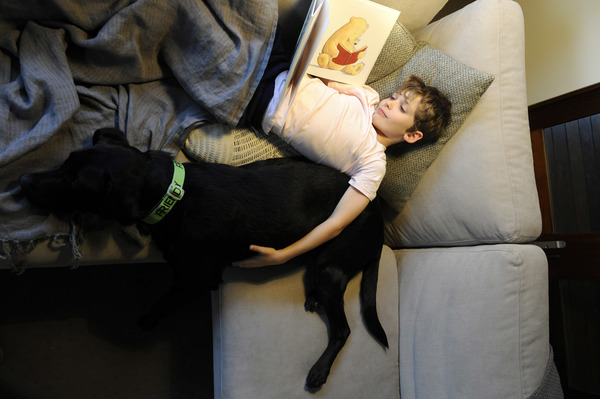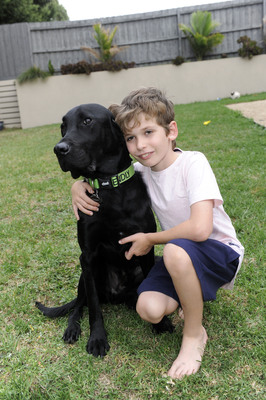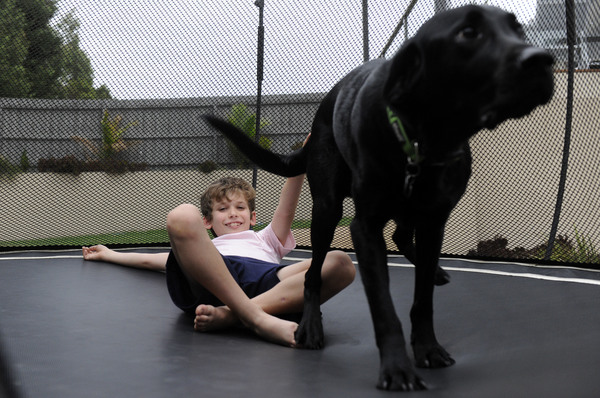By Melissa Grant
Irwin the Labrador Retriever has been a life-changing companion for Berwick boy Ollie Hurst.
In the two years they’ve been best mates, Ollie – who has autism – has become much happier, his anxiety has dramatically reduced and his communication has improved leaps and bounds.
The transformation has been so profound that mum Gillian wants to thank the community for bringing Irwin into their lives and “pay it forward” to help other children, like Ollie, be gifted their own companion dog.
“Ollie is very, very different to how he was,” Gillian said.
“Before we got Irwin, Ollie didn’t speak in front of anyone he didn’t really know and now he’s a chatterbox.
“We really just want other families to have their lives made easier.”
Ollie, 9, was diagnosed with autism five years ago after Gillian and her husband Jack noticed he was shy and wouldn’t make eye contact with people outside their family. He was also having meltdowns triggered by small changes to his routines, couldn’t sit still and was struggling to sleep.
When Gillian met a companion dog in training she knew she had to find out more.
The woman raising that puppy put her in touch with Dogs for Kids with Disabilities, an organisation which specialises in training dogs for children with autism and other developmental disorders.
Soon afterwards, Ollie underwent an assessment that determined he would greatly benefit from a companion dog.
Irwin was matched with Ollie and it wasn’t long before the pair forged a very special bond.
These days they virtually do everything together, from jumping on the trampoline to playing basketball.
They even fall asleep together, which has been a welcome development given Ollie had a lot of trouble getting to sleep and would wake multiple times during the night.
“Irwin goes on Ollie’s bed and helps him fall asleep. He helps to settle him,” Gillian said.
“He also helps him with his anxiety. Ollie is so much less anxious in every situation.”
Irwin is also great with the other Hurst children, 14-year-old Ella and 11-year-old Cooper.
“He always make sure he finds the others to give them a cuddle too – but he knows Ollie is his special child,” Gillian said.
Although dogs like Irwin are worth their weight in gold, they don’t come cheap.
A companion dog, which provides friendship to a child in the home, costs over $15,000 to raise and train. A full assistance dog, which can go in all public spaces including shopping centres, costs about $25,000.
Dogs for Kids with Disabilities founder Katie Hunter said the charity relied on fundraising and donations to raise and train the dogs, which are primarily labradors and golden retrievers sourced from specialist lines around the world.
Between eight and 10 of the life-changing dogs go out to families each year.
They are formally trained up until 18 months and then have “doggy dates” to see if they click with a child.
“The dogs have their own personalities, so it’s important to get to know what their strengths and weaknesses are and match them to the client,” Katie said.
“Some love riding escalators, while some like cuddles and a cushy job.”
The dogs work alongside a range children with special needs.
“For some families they might want a dog who lays on the child and helps with sensory regulation,” Katie explained.
“Some kids want a friend to play footy with. Some want a dog next to them while they play iPad or watch TV.”
Katie worked as a dog trainer for six years before starting the charity in 2012.
“What I saw is that dogs can build bridges that people can’t – they can be our best friends, they can make us feel safe and secure and willing to try everything,” she said.
“If we can get them (the kids) connected and engaged, we can show them the world is a good place to be and that there is support as well.”
The Hursts are forever grateful for the community support they received that allowed Irwin to be part of their family.
“Ollie has been able to progress so much because of this organisation,” Gillian said.
Dogs for Kids with Disabilities is in need of donations, particularly from businesses. If you can help visit http://www.dkd.org.au/










